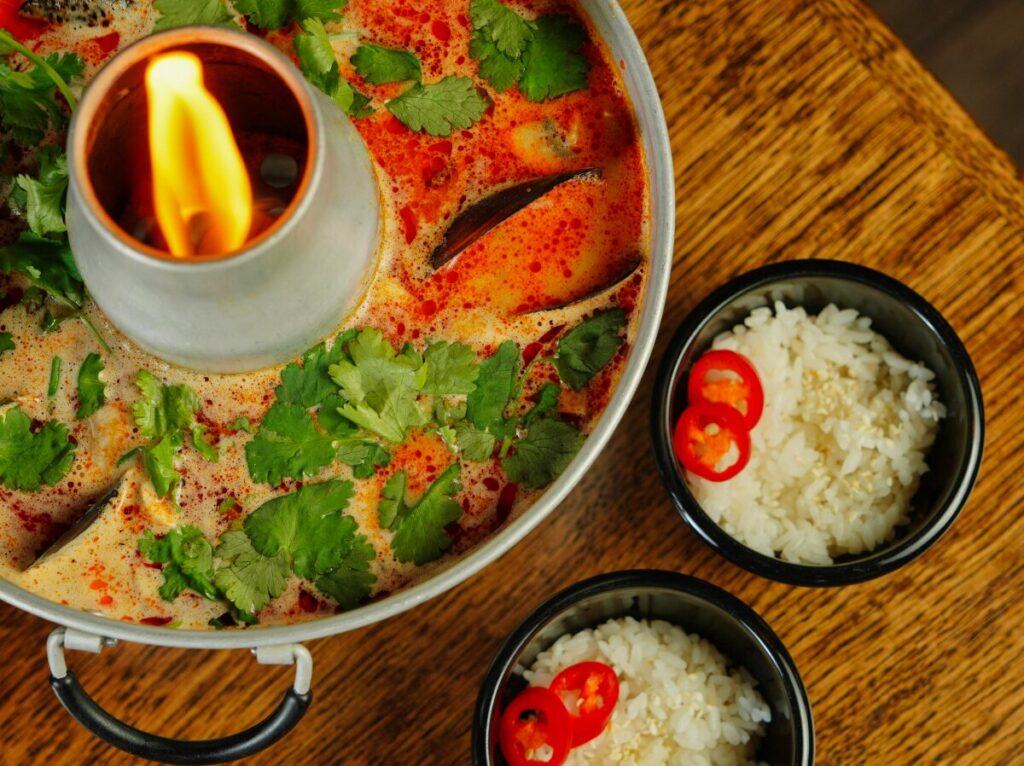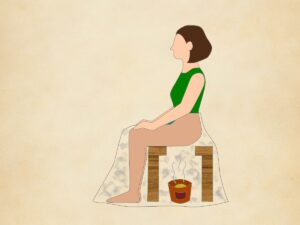Common Thai Herbs and Their Healing Properties
Walking through fresh markets or supermarkets in Thailand, you’ll encounter an array of Thai herbs. Some may be familiar, while others might be new to you. These herbs are not only staples in Thai cuisine but also rich in therapeutic properties that can help you use food as medicine to maintain and improve your health. Here are a few common Thai herbs that are both delicious and beneficial:

Holy Basil (Kaprow)
One of the most popular choices at made-to-order restaurants and food stalls, holy basil (kaprow) is a staple in Thai dishes, often paired with meat or mushrooms. Known as Tulsi in Ayurveda, it is revered as the “Elixir of Life” for its adaptogenic properties, which help balance the body’s fire element and reduce physical, chemical, and mental stress.
Traditional Thai medicine describes holy basil as having a pungent, hot taste that aids in expelling gas, treating colic, relieving bloating and stomach pain, and improving digestion. It also helps eliminate excess fat and sugar, reducing blood sugar levels and overall body fat.
Gotu Kola (Bai Bua Bok)
Gotu kola (Centella asiatica) is a versatile medicinal herb native to Asia. Commonly found as a refreshing herbal juice in Thailand, it is well-known for healing internal bruises and offers additional benefits, such as aiding digestion, soothing ulcers, and reducing inflammation. Its cooling properties make it particularly beneficial for individuals with excess heat in their bodies.
As a powerful brain tonic, gotu kola enhances memory, focus, and cognitive function. It also reduces stress, improves mental clarity, and delays age-related conditions. Additionally, it promotes collagen production, rejuvenates skin, accelerates wound healing, and supports cardiovascular health by improving circulation and lowering blood pressure.
Lemongrass (Ta Krai)
Lemongrass is a fragrant herb celebrated for both its culinary and medicinal uses. It supports kidney function, aiding detoxification by flushing out toxins. Its calming effects reduce stress, improve sleep, and support nervous system health. Additionally, lemongrass is effective in managing type 2 diabetes by maintaining insulin levels and improving glucose tolerance.
This herb also serves as a natural remedy for pain and inflammation, particularly for arthritis, muscle soreness, and swelling. It helps reduce fever and alleviate cold symptoms, making it a go-to choice for respiratory relief. Lemongrass’s unique aroma can ease dizziness and nausea. Beyond its medicinal properties, it supports cardiovascular health by lowering bad cholesterol (LDL) and triglycerides, helping prevent arterial plaque buildup.

Galangal (Kha)
A rhizome in the ginger family, galangal is a key ingredient in Thai cuisine, enhancing flavors and masking unpleasant odors in dishes like soups and curries. Beyond its culinary applications, galangal offers numerous medicinal properties, such as stimulating appetite, aiding digestion, and improving circulation.
Its essential oils treat respiratory issues like colds, coughs, and sore throats while soothing nausea, bloating, and indigestion. Galangal is also effective in addressing food poisoning, diarrhea, and stomach ulcers. Its antimicrobial properties make it useful for treating skin infections, rashes, and insect bites, while its anti-inflammatory qualities relieve muscle pain and swelling.
Fingerroot (Krachai)
Krachai, or fingerroot, is a popular herb in Thai cooking, often used in dishes like jungle curry and stir-fries. Its aromatic flavor and ability to neutralize fishy odors make it indispensable in seafood dishes. Traditional Thai medicine considers yellow krachai superior to the black variety for its therapeutic benefits.
Known as the “Thai ginseng,” krachai boosts vitality, balances hormones, and supports sexual health. It also aids digestion, strengthens bones, and regulates bodily systems. Modern research highlights its potential to combat inflammation, oxidative stress, and certain parasites and bacteria. Krachai’s active compounds show promise in treating conditions such as malaria, intestinal infections, and even some cancers.
Conclusion
Thai herbs are more than just ingredients in flavorful dishes—they are natural remedies with profound health benefits. From holy basil’s stress-reducing and digestive properties to gotu kola’s brain-boosting and skin-rejuvenating effects, these herbs embody the concept of using food as medicine. This is just the beginning—many more herbs and their benefits await exploration. By incorporating these herbs into your daily life, you can pave the way for a healthier, more balanced lifestyle.


